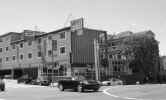Get ’em offa da
streets! The District 6 bailiwick of
Supervisor Chris Daly includes the low-income hard-lot turfs of
the Tenderloin and South of Market. Because the good supervisor has
an inquiring mind, he recently sent a query to the Mayor’s Office
of Housing, posing three simple questions. A month later, Director
Marcia Rosen replied… sort of. Her letter is on file at the
clerk’s office, but here is a sample:
1. Investigate and report on the number of
formerly homeless people placed in permanent housing annually
for each of the last six years.
The Mayor’s Office of Housing does not have
any data relating to this request….
2. What is the number of people waiting for
housing who are currently homeless or marginally housed?
Again, MOH does not have data which can provide
information on this matter….
3. What is the number of new affordable housing
units constructed specifically for formerly homeless people in the
last six years, and how many will be built in the next four years?
Here, Rosen was on firmer ground: Altogether,
some 2,341 units or beds in group housing have been developed in the
past six years…. In addition, the list shows that an additional
1,438 units and beds are under development at present, both under
construction and in planning.
Imagine: 2,341 units or beds in the past six
years. Unless my math teacher taught me wrong, that works out to 390
spaces a year, to aid a homeless population usually estimated in the
neighborhood of 14,000.
Not bad. During the same time period, the Grim
Reaper managed remove only approximately 150 homeless people from
our city’s streets each year.
Everybody into the streets. Marcia
Rosen’s job may become twice as difficult if San Francisco’s
dot.commers follow the lead of their Spanish brethren and sistren. CNN
reported on June 1 that a group of 1,200 former telecommunications
workers and their families have created a high-tech shantytown in
Madrid, complete with “libraries, bars, hot showers, and
cafeterias serving daily meals.” They’re living well, taking
electricity from underground road sensors and water from city mains.
The squatters found themselves unemployed after
their financially ailing company, which had been bought up by a
Miami-based firm, went broke. They’re in it for the long haul,
parking themselves in easy view of government ministries and
downtown offices “until the government intervenes to guarantee
their jobs and forces [the Spanish telephone company] Telefonica to
settle a multimillion dollar debt to the firm, which would cover
their unpaid salaries.”
Everybody back to the internet. The
World Bank learns fast, says Normon
Solomon in a column published on May 24. Alerted to the
possibility of demonstrations in the streets of Barcelona at its
next global meeting, scheduled for late June, the organization
bailed … and moved to the net. Says one official, “A conference
on poverty reduction should take place in a peaceful atmosphere free
from heckling, violence, and intimidation.” Adds Solomon, “At
the same time that creative advocates for social change are
routinely putting the internet to great use, powerful elite bodies
like the World Bank are touting online innovations as democratic
models — while striving to elude the reach of progressive
grassroots activism.” As the opponents of global corporatism
regroup, it’s easy to imagine their new rallying cry: Hackers of
the world, unite!

Sprint slowed to a walk.
The following was to appear on the back page of the Call this week,
from the agenda of the San
Francisco Planning Commission for June 7, 2001: 2201 VAN
NESS AVENUE — northeast corner at
Broadway; Lots 007, in Assessor’s Block 570. Request for
Conditional Use Authorization pursuant to Section 209.6 of the
Planning Code to install a total of three antennas and a base
transceiver station on an existing four-story building as part of
Sprint’s wireless telecommunications network.
But a bunch of in-your-face neighbors decided
otherwise. Doug Loranger reports, “We learned yesterday
that Sprint has withdrawn its application for 3 antennas at the
corner of Broadway & Van Ness, one day before the Planning
Commission was poised to approve it. This is a major victory for the
neighbors of this site and for all San Franciscans concerned about
the safety of wireless antennas. Mark Longwood, Barbara Wirth,
and others did a superb job in organizing their neighborhood,
gathering the support of the Russian Hill Neighborhood Association,
Polk St. Merchants Association, the President of the Academy of Art
College, and the residents of the College dormitory, the parents of
children at St. Brigid School, and the seniors at Notre Dame
Apartments, among others. Everyone who took part in the October 15
demonstration at this location also deserves a tip of the hat.”
BS is for Bumper Sticker. The
winner this week, spotted at the top of Bernal Hill, carries a
quotation from Albert Einstein: “Imagination is more
important than knowledge.” Yeah, right. Tell that to the
guy who’s taking out your appendix.
B.C.